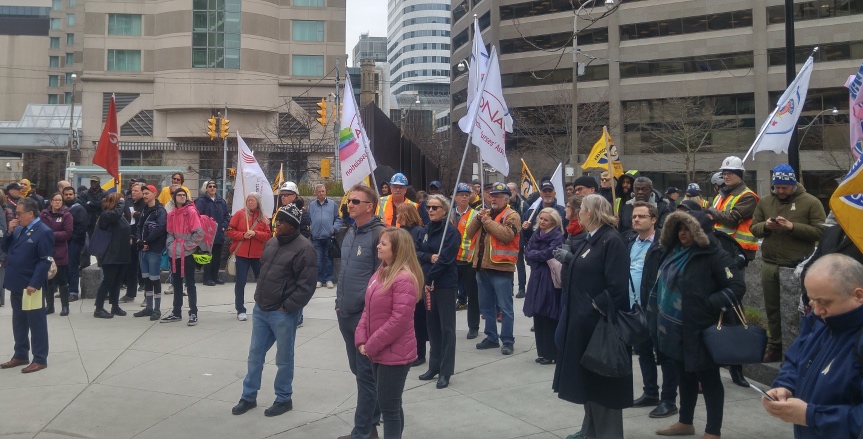The Lac-Mégantic runaway train disaster — one of the most tragic events in recent Canadian history — happened because of negligence at the workplace. Forty-seven people died on that fateful day on July 6, 2013, as a derailed train carrying crude oil exploded in the downtown area.
But none of those deaths were officially counted as work-related fatalities despite a clear link to workplace safety regulations.
The Lac-Mégantic case isn’t an aberration. Official statistics show close to 1,000 work-related deaths occur across Canada annually, but research published in the Journal of Canadian Labour Studies estimated that the actual number is approximately 10 to 13 times greater.
“Based on our conservative numbers alone, [this] is just shocking in its own right,” says Steve Bittle, one of three co-authors of the study.
He says this is “just the tip of the iceberg” and more research needs to be done to understand the extent of the problem.
Why is official data collection so misleading?
The authors assert that the method of data collection on workplace fatalities is rooted in the capitalist mode of production. Since the role of the capitalist state is to facilitate business, it doesn’t have an incentive to research the links between work and casualties.
After all, more accurate data would result in a greater demand for improved health and safety and thereby increase the costs of conducting business.
“We have to understand that the state, even if it purports to have our interests at heart, is a capitalist state,” says Bittle. “Even when the state does make decisions to protect workers, ultimately they are going to ensure the long-term stability of this system of capitalism.”
So as opposed to the state tracking work-related deaths for the purpose of protecting its citizens, the official statistics come from the no-fault workers compensation system, which doesn’t assign blame or responsibility.
The missing deaths
The authors note that many forms of cancers and diseases have a direct link to workplace environments, but only count towards work-related fatalities if they are compensable by the provincial or territorial compensation boards.
However, not all occupational diseases are always recognized as such. The study notes the long history of workers’ struggle for certain diseases to become compensable.
But even when those ailments are finally acknowledged as work-related, such as in the case of General Electric workers in Peterborough, many claims are either not filed or are rejected by compensation boards.
The study attributes low claim rates for certain diseases due to several factors including lack of awareness among victims and/or their families; the long latency period between exposure and diagnosis; and even doctors being unable to make the connection to work.
Other types of fatalities excluded from official data include suicides, which in many cases can be clearly linked to work.
“[In the UK and other places] they have done interviews with family members or co-workers or they have found suicide notes, in which there has been reference made to an intolerable work environment,” Brittle says.
|
Work-related cause of death |
Estimated fatalities |
|
|
Injury fatalities |
Occupational-disease fatalities |
|
|
Association Of Workers Compensation Boards Of Canada (AWCBC)’s average from 2014–16 |
322 |
n/a |
|
Commuting to and from work |
466 |
n/a |
|
Agricultural |
64 |
n/a |
|
Non-reporting/reporting errors |
20 |
n/a |
|
Non-working victims |
90 |
n/a |
|
Work-related suicides |
n/a |
400 to 789 |
|
Mesothelioma |
n/a |
485 |
|
Other cancers |
n/a |
5,985 to 8,939 |
|
Chronic Obstructive Pulmonary Disease (COPD) |
n/a |
2,062 |
|
Estimated injury total |
972 |
n/a |
|
Estimated disease total |
n/a |
8,906 to 12,275 |
|
ESTIMATED TOTAL |
9,878–13,246 |
|
Source: Work-related deaths in Canada by Steve Bittle, Ashley Chen and Jasmine Hebert
Speaking collectively in the neoliberal age
At a National Day of Mourning event in Toronto on April 29, 2019, Ivan Ostos, a food delivery worker shared his story of fracturing his arm in a road accident while on duty. As people gathered around him out of concern for his safety, the first question that popped out of his mouth was, “Is the food okay?”
When he called his employer, he was asked to connect with another rider to ensure the food was delivered.
That twisted sense of obligation to the employer — induced by economic desperation — despite one’s own lack of wellbeing is what Bittle refers to as “the culture of presenteeism,” whereby employees feel compelled to work even when unwell.
He points out the importance of understanding the connection between unsafe work and capitalism, particularly in the current neoliberal period of increasing precarity, as desperate workers lose bargaining power.
But despite the challenges and constraints of our economic system, Bittle says there is opportunity to demand greater protections.
Citing research showing that unionized workplaces are safer, he says speaking collectively is the way for workers to respond.
“[It’s important] to have conversations about taking back control of the workplace so to speak,” Bittle says. [And] understanding that some kind of collective action is the only way in which workers can improve their workplaces, improve their remuneration, and just improve their overall quality of life, as it relates to work.”
Zaid Noorsumar is rabble’s labour beat reporter for 2019, and is a journalist who has previously contributed to CBC, The Canadian Press, the Toronto Star and Rankandfile.ca. To contact Zaid with story leads, email zaid[at]rabble.ca.
Photo: Zaid Noorsumar
Help make rabble sustainable. Please consider supporting our work with a monthly donation. Support rabble.ca today for as little as $1 per month!





